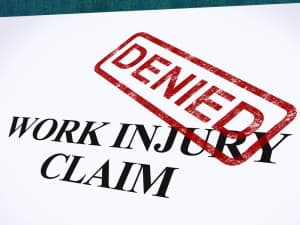
The Virginia workers’ compensation system provides legal protection to workers injured on the job or those with job-related illnesses. The system allows such workers to receive medical benefits and reimbursement for a percentage of their lost wages due to their temporary or permanent disabilities.
However, as our lawyers have observed, obtaining these benefits is not always an easy process. In many situations, your workers’ compensation claim may be denied. Here, we discuss seven specific reasons for the denial of claims:
1. Failure to Notify Your Employer of Your Injury
If a job-related injury or illness occurs – regardless of how serious it may seem – you must notify your employer immediately. In fact, if you fail to provide notice within 30 days, you could lose your right to receive workers’ compensation benefits.
With that said, you should not wait the full 30 days. The sooner you take action after an injury or being diagnosed with an illness, the better off you will be.
In the event of a sudden accident on a job site, you should let your immediate supervisor know as quickly as possible so that you can receive the proper emergency care. Follow up with your employer as soon as you are able to do so. In the event you suffer a job-related illness, inform your employer as soon as the illness or condition is discovered.
Make sure to keep a copy of the written notice that you give to your employer. You want this copy for your own records. If your claim is denied due to an alleged failure to give proper and timely notice, you will be ready to refute it.
2. Failure to File Your Workers’ Compensation Claim Within Time Limits
Under Va. Code Ann. § 65.2-601, you have up to two years from the date of an injury or illness to file your claim with the Virginia Workers’ Compensation Commission. If you fail to act within this two-year period, you will be barred from filing a claim.
Once you have notified your employer of your injury or illness, the employer must file a report with the Commission within 10 days. While your employer may have already done this, the Commission recommends filing a claim yourself to ensure your rights are protected.
3. Having a Non-Work Related Injury or Illness or a Condition Not Covered
The Virginia workers’ compensation system covers only injuries that occur within the course and scope of your employment. For example, if part of your job involves running errands in an automobile, you would be covered in the event of an accident while running those errands. On the other hand, if your accident occurred while you were on the way to work, you would not be covered.
In addition to non-work related injuries, you will not be eligible for workers’ compensation coverage if you were under the influence of alcohol or drugs when your injury occurred or if you were engaged in reckless behavior on the job.
4. Not Being Covered as an Employee
Virginia law requires any business with two or more employees to carry workers’ compensation insurance coverage. These benefits must be provided to both part-time and full-time employees as well as seasonal and temporary workers.
Additionally, contractors must provide workers’ compensation coverage for subcontractors and their employees. Even if a subcontractor carries workers’ compensation insurance, the contractor using the subcontractor’s services must also provide coverage if there are more than two people working.
5. Having a Pre-Existing Condition Not Aggravated by Your Work Injury
When you file a claim for workers’ compensation benefits, the doctor who treated your injury or illness will need to submit an Attending Physician Form.
If you have a pre-existing condition that was aggravated as the result of your job-related injury, it should be covered. For example, if you became ill from breathing toxic fumes and you had asthma as a pre-existing condition, it would likely be covered.
If you breathed in fumes and had degenerative disc disease as a pre-existing condition, treatment for your back pain would likely not be covered. In other words, your eligibility for benefits would need to be connected to or aggravated by the fumes.
6. Failure to Cooperate with the Insurance Company
When you are injured on the job, your employer will report it to the insurance company. You may be required to fill out additional forms, provide written or verbal statements or consent to a release of certain medical records.
You should consult with an experienced workers’ compensation attorney before making any statements to the insurance company. However, it is important to cooperate with the insurance company – failure to do so could result in your benefits being denied.
Additionally, if your doctor recommends a suggested course of treatment, you fail to provide proof of treatment to the insurance company or the insurer uncovers evidence that you are not following the doctor’s course of treatment, those may also be potential reasons for a denial of your workers’ compensation claim.
Our Virginia Workers’ Compensation Attorneys Can Help You
If you or someone you care about has suffered an on-the-job injury or illness and has been denied workers’ compensation benefits, get in touch with Marks & Harrison without delay.
Our experienced workers’ compensation attorneys will provide aggressive legal representation and assist you in pursuing the benefits you deserve.
We can examine the reasons why your workers’ compensation claim was denied and go through the necessary process to appeal the decision. We serve clients in Richmond and from ten other offices located throughout Virginia. Call or contact us online today for a free consultation.



















